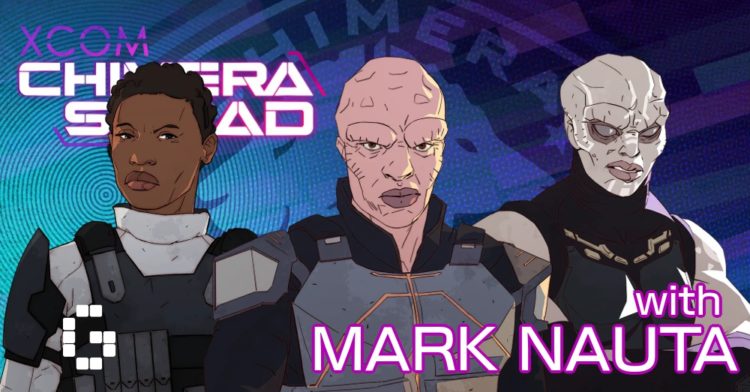With XCOM: Chimera Squad coming out, the trailers have already shown off some marked differences series veterans could look forward to experiment with. You can check out our review of the game here. We got curious about certain aspects of the game and emailed the team for some answers, and here’s what we got from Mark Nauta, Lead Designer of XCOM: Chimera Squad.
As you might have gathered from our review, there are 11 candidates, including the initial members, who will be part of the XCOM Reclamation Agency. Only 4 more can be hired, so we asked a) how the hiring options get triggered, b) if the candidates offered are random, and c) if players can influence this in any way.

Each player will begin their first playthrough with the same four agents: Godmother, Terminal, Cherub and Verge. Progressing through the campaign will allow the recruitment of additional agents, which will occur automatically based on game progression. When the option presents itself, players will be able to choose one new recruit among three random agents. Agents not recruited during the campaign will be automatically unlocked once players beat the game. Subsequent playthroughs will allow players to select their four starting squad members from any previously unlocked agents.
Unlike the previous XCOM games, once an agent falls, it’s game over in Chimera Squad. The reasoning Nauta provides is that permadeath in the previous games made sense narratively and in gameplay. Losses are to be expected in a war of attrition against a superior foe, and veteran soldiers are not immune to death. Their loss could mean you no longer have skills or abilities you had relied on for success.
“Losing a veteran soldier was also a major consequence in those games. A soldier’s death could leave you without certain skills and abilities you relied on for success.”
In Chimera Squad, however, you get a specific set of unique characters, and permadeath felt counter to that experience. Players tend to reload when they lose a certain soldier anyway, so a compromise was made. If an agent bleeds out on the battlefield, you lose that mission, not the agent. Stabilizing an agent will mean the mission can continue, but there will nevertheless still be consequences for getting them seriously wounded.
“Losing an agent means you have to restart the mission and adapt your tactics to make sure everyone comes home.”
It’s possible to lose the game at a strategic level. Fans who like the challenge of permadeath can look forward to the Hardcore mode in the game.
With the unique agents in the game, you could consider that there aren’t strict “classes” anymore, but they can still fit into archetypes. Claymore seems to be the only one who can be considered the “Heavy”, but each agent basically has their unique set of skills and is designed to excel in a specific role within the squad.
If you want a damage sponge, Claymore, Axiom and Zephyr can be your picks. However, all of them can be customized and outfitted appropriately with different types of armour – from negating damage received or improving dodge ability. If you can get Agent Terminal to consistently heal – or with Medikits – or be shielded by Agent Cherub, any Agent could temporarily be the “Heavy”.
Finishing the three major investigations within Chimera Squad will start the fourth – and final – act at once. When this occurs, you get locked out from researching tech you’ve uncovered from clearing these investigations, some of them able to unlock useful utility items. Nauta explains a certain level of challenge have come to be expected from XCOM games; there are various difficulties to suit a larger pool of players, but Chimera Squad is also meant to match the intensity of its predecessors. Thus, players will need to make their decisions and utilize their resources as best they can in a high-pressure environment.

We’ve also mentioned the curious thing about how your Chimera Squad units who are Archons, Muton berserkers and Andromedon still retain their XCOM 2 design. With ADVENT no longer existing to genetically engineer these alien species, their physiology hasn’t changed significantly since the end of the previous game. Besides, the aliens you do fight generally oppose peaceful coexistence and don’t see the point of integrating into their new society.
“Many do not wish emulate human culture, but have also not yet developed a distinct culture of their own.”
Many thanks to Mark Nauta for answering our questions! With this eclectic crew of aliens and humans, it’ll still be down to you to make this peace work. What happens after you’ve saved the world once? Find out how it turns out in XCOM: Chimera Squad!
Get some tips to protect City 31 here!











![[EXCLUSIVE] Inside Japan’s Indie Game Revolution – An Interview with BitSummit Organizer Masahiko Murakami](https://cdn.gamerbraves.com/2025/05/BitSummit-Orgainzer_Interview_FI-360x180.jpg)
![[EXCLUSIVE] The Art of Adaptation: Developer Interview Details the OVERLORD Mobile RPG Lord of Nazarick](https://cdn.gamerbraves.com/2025/05/Lord-of-Nazarick_Interview_FI-360x180.jpg)
![[EXCLUSIVE] Taking Gundam in Bold New Directions – Interview with GQuuuuuuX Director Kazuya Tsurumaki](https://cdn.gamerbraves.com/2025/04/Kazuya-Tsurumaki_Interview_FI-1-360x180.jpg)


![[SEA Exclusive] From Shadows to Shipwrecks – Jennifer English Talks About Bringing Emotional Depth to Clair Obscur: Expedition 33](https://cdn.gamerbraves.com/2025/04/Clair-Obscur-Jennifer-English_Interview_FI-360x180.jpg)

![[EXCLUSIVE] Do the Game Interview – An Intimate Look at the Challenges of Game Development](https://cdn.gamerbraves.com/2025/04/Do-the-Game_Interview_FI-1-360x180.jpg)
![[EXCLUSIVE] Interview with the Minds Behind of Den of Wolves – 10 Chambers’ New Sci-Fi Heist FPS](https://cdn.gamerbraves.com/2025/04/Den-of-Wolves_Interview_FI-360x180.jpg)









![[GUIDE] SD Gundam G Generation Eternal Unit Tier List](https://cdn.gamerbraves.com/2025/04/SD-Gundam-G-Generation-Eternal-Tier-List_Review_FI-360x180.jpg)
![[GUIDE] Clair Obscur: Expedition 33 Tier List – From Gustave to Verso: Who Deserves Your Party Slot?](https://cdn.gamerbraves.com/2025/04/Clari-Obscur-Expedition-33-Character-Tier-List_Guide_FI-360x180.jpg)